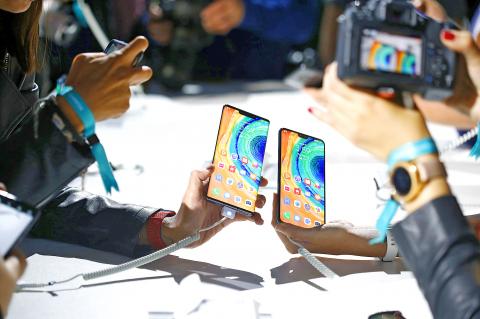Chinese tech giant Huawei Technologies Co (華為) yesterday said that its revenue for the first nine months of the year grew 24.4 percent year-on-year, despite a US campaign to isolate the company globally.
Revenue jumped to 610.8 billion yuan (US$86.2 billion) and its profit margin grew 8.7 percent, the company announced.
The firm has been under immense pressure this year as Washington lobbied allies worldwide to avoid the company’s telecom gear over security concerns, and in May blacklisted it from both the US market and buying crucial US components.

Photo: Bloomberg
The US has expressed concerns that Huawei equipment could contain security loopholes that allow China to spy on global communications traffic, but the company has repeatedly denied the accusation.
“Huawei has maintained its focus on ICT [information and communications technologies] infrastructure and smart devices, and continued to boost the efficiency and quality of its operations,” a company statement said.
“This contributed to increased operational and organizational stability and solidified the company’s performance in the first three quarters of 2019,” it said.
Huawei on Tuesday said it welcomed the German government’s move to “create a level playing field” for 5G suppliers, after Berlin released draft security guidelines for next generation wireless networks that stopped short of banning Huawei, even though the US warned again it would reconsider intelligence sharing with allies that use the company’s equipment.
The German Federal Network Agency catalog of conditions for suppliers of new 5G networks include requiring certification of critical components and ensuring trustworthiness of manufacturers, without singling out Huawei for exclusion.
Meanwhile, Huawei is betting it can find customers for its 5G gear in India, where the government has yet to weigh in on US calls for a boycott of the firm.
“The approach we took to engage with the Indian government is very transparent, direct and cooperative,” Jay Chen (陳明杰), chief executive officer of Huawei’s India business, said in an interview in New Delhi on Tuesday. “We have given a full commitment to follow all rules and regulations, full compliance.”
India, the largest wireless market outside China by number of subscribers, has been a focus for investment by Huawei, even though the government has yet to set dates for auctioning 5G spectrum to carriers.
The company’s products remain essential to India’s wireless ecosystem and technological development, Chen said.
Thus far, top carriers Reliance Jio Infocomm Ltd and Bharti Airtel Ltd have decided to work with non-Chinese equipment manufacturers for 5G trials, the Business Standard newspaper reported last month, citing people it did not identify.
Vodafone Idea Ltd is working with Ericsson AB, Nokia Oyj and Huawei on developing 5G technology, according to the newspaper.
Jio and Airtel declined to comment, the paper said.
Additional reporting by AP and Bloomberg

SEEKING CLARITY: Washington should not adopt measures that create uncertainties for ‘existing semiconductor investments,’ TSMC said referring to its US$165 billion in the US Taiwan Semiconductor Manufacturing Co (TSMC, 台積電) told the US that any future tariffs on Taiwanese semiconductors could reduce demand for chips and derail its pledge to increase its investment in Arizona. “New import restrictions could jeopardize current US leadership in the competitive technology industry and create uncertainties for many committed semiconductor capital projects in the US, including TSMC Arizona’s significant investment plan in Phoenix,” the chipmaker wrote in a letter to the US Department of Commerce. TSMC issued the warning in response to a solicitation for comments by the department on a possible tariff on semiconductor imports by US President Donald Trump’s

The government has launched a three-pronged strategy to attract local and international talent, aiming to position Taiwan as a new global hub following Nvidia Corp’s announcement that it has chosen Taipei as the site of its Taiwan headquarters. Nvidia cofounder and CEO Jensen Huang (黃仁勳) on Monday last week announced during his keynote speech at the Computex trade show in Taipei that the Nvidia Constellation, the company’s planned Taiwan headquarters, would be located in the Beitou-Shilin Technology Park (北投士林科技園區) in Taipei. Huang’s decision to establish a base in Taiwan is “primarily due to Taiwan’s talent pool and its strength in the semiconductor

Industrial production expanded 22.31 percent annually last month to 107.51, as increases in demand for high-performance computing (HPC) and artificial intelligence (AI) applications drove demand for locally-made chips and components. The manufacturing production index climbed 23.68 percent year-on-year to 108.37, marking the 14th consecutive month of increase, the Ministry of Economic Affairs said. In the first four months of this year, industrial and manufacturing production indices expanded 14.31 percent and 15.22 percent year-on-year, ministry data showed. The growth momentum is to extend into this month, with the manufacturing production index expected to rise between 11 percent and 15.1 percent annually, Department of Statistics

An earnings report from semiconductor giant and artificial intelligence (AI) bellwether Nvidia Corp takes center stage for Wall Street this week, as stocks hit a speed bump of worries over US federal deficits driving up Treasury yields. US equities pulled back last week after a torrid rally, as investors turned their attention to tax and spending legislation poised to swell the US government’s US$36 trillion in debt. Long-dated US Treasury yields rose amid the fiscal worries, with the 30-year yield topping 5 percent and hitting its highest level since late 2023. Stocks were dealt another blow on Friday when US President Donald